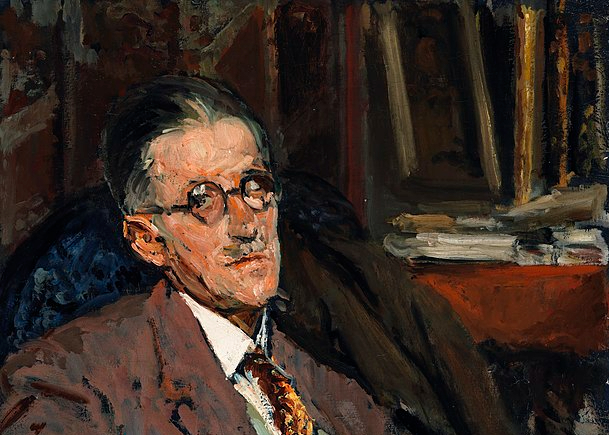Sally Rooney’s ‘Intermezzo’ Discloses a Deep Debt — to James Joyce’s ‘Ulysses’
The novelist, called a ‘Salinger for the Snapchat generation,’ writes under the long shadow of Ireland’s greatest author.

‘Intermezzo’
By Sally Rooney
Farrar, Straus and Giroux, 464 pages
The novelist Sally Rooney’s new book, “Intermezzo,” is the work of a writer nearing the peak of her powers. It is the fourth novel from the 33 year-old Irish author who burst on the literary scene with “Conversations With Friends,” followed in short order by “Normal People” and “Beautiful World, Where Are You.” If there is such a thing as zeitgeist anymore, Ms. Rooney distills it. The power of “Intermezzo,” though, is partially on loan — from James Joyce.
There would at first glance be little to link the two authors besides for their Irishness. Joyce died 83 years ago. His opus, “Ulysses,” was banned as obscene in his life, and money was a perennial problem. He was born into an Ireland so religious that he was, in a phrase he repeatedly used, “exiled.” When he expired at Zurich, the Irish government wondered “If possible find out if he died a Catholic?” Dublin declined to send a representative to the funeral.
Ms. Rooney, though, inhabits to what amounts to a different country. She describes herself as a Marxist and her work is celebrated by the likes of President Obama and Taylor Swift. “Normal People” was translated into a popular television series, and Ms. Rooney is accumulating prizes at a rapid clip. The release of her books is accompanied by fanfare that is rare in this digital age. Her anti-Israel position is a bellwether for the stance of the literary set.
“Intermezzo” centers on a pair of brothers, Ivan and Peter Koubek. Ivan, awkward and brilliant, was a chess prodigy whose game has stalled in his early 20’s, though he is still adroit enough to best 10 amateur players at once. Peter is a lawyer who possesses the social graces that his brother lacks, though both are swimming in the unhappiness precipitated by the recent death of their father. The fraternal relations are jagged, animosity marbled by tenderness.
Both Ivan and Peter are enmeshed in alternatively unhappy and vivifying love affairs. Ivan falls in love with an older woman, Margaret, whose first marriage dissolved in rivers of alcohol. Peter balances two women. His relationship with a professor, Sylvia, is upended by a car accident that leaves her wounded in body and mind. To Naomi, a 22 year-old college student, he is something between a sugar daddy and a boyfriend.

Ms. Rooney is most interested not in what happens to her characters but what transpires inside of them. “Intermezzo” expands her use of stream of consciousness as a narrative technique. Each character’s thoughts have their own cadence. Internal worlds have distinct weather. Peter, in bed with Sylvia, thinks “When they. Yes: the way she was. Perfect, everything. The life they wanted. Her pride in that remembrance worse than touching.”
Margaret’s thoughts hum differently. “Adolescent dream of attending university in Paris: sunlit boulevards, tempestuous love affairs, autumn afternoons at the Louvre. Went instead to Galway, hung around in poorly ventilated apartments smoking hash with boys who played acoustic guitar. The romance of those years.” Ivan tells himself to “remember everything … every breath exactly.” Where did Ms. Rooney come about this style?
A model close at hand is another Irish writer, Eimear McBride, who is just 15 years older than Ms. Rooney. Ms. McBride’s strongest work is “A Girl Is a Half-Formed Thing.” A representative portion of it reads “This wrong doubtful body should not have been mine. Mine was. Not this. Was perfect … Swallow me down. Drag me in the gullys. In the pipes please and the drains.” Ms. Rooney’s prose, though, is more cerebral and quizzical. It keeps chess in mind.
Enter James Joyce — stage right. “Ulysses” is the account of one day at Dublin from the perspective of an Irish Jew, Leopold Bloom. Like Joyce, Ms. Rooney is alert to the agony and ecstasy of sex as well as Dublin’s geography. She describes the “sweep of freckles” on Naomi’s cheekbone and “Dublin in the rare, etc.” Religion is never far from the surface in the Land of Saints and Scholars — “Christ also survived his own death. And was dignified and exalted.”
Ms. Rooney in 2022 gave a lecture at the Abbey Theatre at Dublin called “Misreading ‘Ulysses.’” She called it a “book not only worth reading, but worth misreading, arguing with, reinterpreting, even rewriting, making our own.” She celebrates Joyce’s prose for its “density, its radical novelty, and for its exquisite and unexpected beauty.” Now, as she comes into a mature style, she is borrowing wholesale from the master.
There are moments in “Ulysses” that so anticipate Rooney’s voice as to preempt it. These include “Can’t bring back time. Like holding water in your hand” and “Every life is in many days, day after day. We walk through ourselves, meeting robbers, ghosts, giants … but always meeting ourselves.” What the younger writer could learn from the older is his all-encompassing sympathy for the renegade, the reactionary — and even the Jew.

